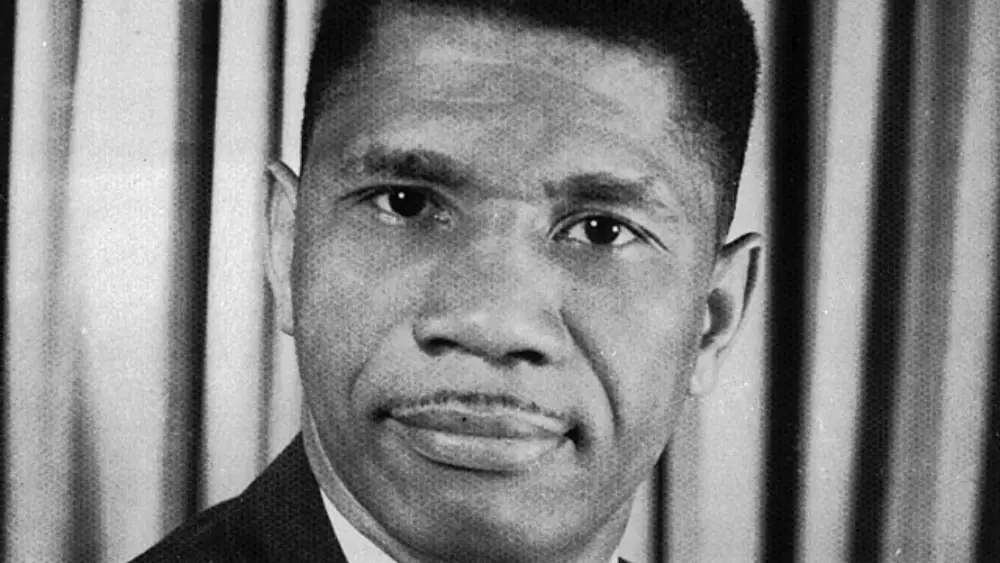Medgar Wiley Evers was a fierce advocate for justice and equality, a dedicated leader who risked his life to confront systemic racism and defend the rights of African Americans. His courageous work laid crucial groundwork for the civil rights movement in Mississippi and beyond, enshrining his legacy in the struggle for equality in America.
Early Life and the Harsh Reality of Racism
Born in 1925 in Decatur, Mississippi, Medgar Evers grew up in the heart of the segregated South, where discrimination and violence were part of everyday life for Black families. Evers witnessed firsthand the cruelty of racism. At twelve, Evers witnessed the lynching of a family friend, with the victim’s bloodstained clothing displayed as a symbol of terror for over a year. Despite these traumatic experiences, he was determined to improve his own life and help others facing racial injustice. At seventeen, Evers enlisted in the U.S. Army during World War II, serving in a segregated unit in Europe. His courage in the military laid the foundation for his lifelong commitment to civil rights.
The contrast between the treatment of Black soldiers abroad and the oppression they faced at home galvanized Evers. After an honorable discharge in 1946, he returned to Mississippi, determined to “straighten this thing out.” Evers soon enrolled at Alcorn College (now Alcorn State University), where he majored in business and met his wife, Myrlie Beasley. Together, they would become a powerful force in the fight for civil rights.
Civil Rights Activism with the NAACP
In 1954, Evers applied to the University of Mississippi Law School following the Supreme Court’s decision in Brown v. Board of Education, which declared segregated public schools unconstitutional. When he was denied admission, the NAACP took notice of Evers’s determination, appointing him as Mississippi’s first field secretary that same year. Evers, his wife, and their three children moved to Jackson, Mississippi, where he became a fearless leader in organizing boycotts, protests, and sit-ins across the state.
Evers’s leadership was pivotal during the movement’s most challenging years. He initiated a boycott against local businesses that refused to serve Black customers and coordinated a campaign to desegregate public facilities, which helped draw national attention to the injustices endured by Black citizens in Mississippi. Evers was also instrumental in the push for James Meredith’s enrollment at the University of Mississippi in 1962, which became a significant victory for the Civil Rights Movement.
Medgar Evers: Facing the Threats Head-On
By the early 1960s, Evers’s work with the NAACP had made him a target for white supremacist groups. In 1963, he and his family faced frequent threats, and they endured a firebombing of their home. But rather than retreat, Evers’s resolve only strengthened, and he continued working up to twenty hours a day, organizing boycotts, marches, and protests throughout the South. Evers became known for his dedication and his belief that change was possible if enough people were willing to fight for it.

The Assassination of a Civil Rights Leader
On June 12, 1963, just hours after President John F. Kennedy addressed the nation on civil rights, Evers returned home from an NAACP meeting. At twelve, Medgar Evers witnessed a family friend’s lynching, with the victim’s bloodstained clothing displayed as a symbol of terror for over a year. Despite this traumatic experience, Evers resolved to improve his life and fight against racial injustice. At seventeen, he enlisted in the U.S. Army during World War II. He served with courage in a segregated unit in Europe, determined to make a difference.
Justice and Legacy
The pursuit of justice for Evers’s murder spanned decades. All-white juries tried Beckwith twice in the 1960s, but both trials ended without a conviction. It wasn’t until 1994, thirty-one years after Evers’s assassination, that Beckwith was found guilty. A racially diverse jury sentenced him to life in prison.
Evers’s widow, Myrlie Evers, became a prominent figure in the movement, continuing her husband’s fight for civil rights. She eventually served as the NAACP’s chair from 1995 to 1998. Evers’s brother, Charles, succeeded him as field secretary in Mississippi. In 1970, officials established Medgar Evers College in Brooklyn, New York, to honor his contributions.
Remembering Medgar Evers
Medgar Evers’s story reminds us of people’s sacrifices for the freedoms we value today. His determination, bravery, and relentless pursuit of justice have left a permanent mark on the Civil Rights Movement. As a husband, father, and leader, Evers stood up to racism, even at the cost of his life. His legacy continues to inspire generations of activists committed to a world free from discrimination.
In the words of Evers himself, “You can kill a man, but you can’t kill an idea.” His life and work remind us that the struggle for justice is a shared responsibility. His courage will always be a beacon in the fight for equality.











